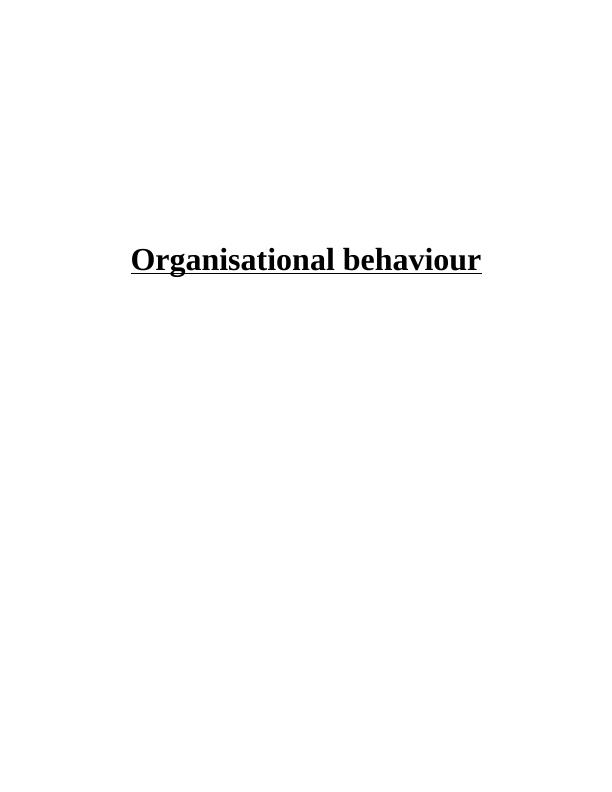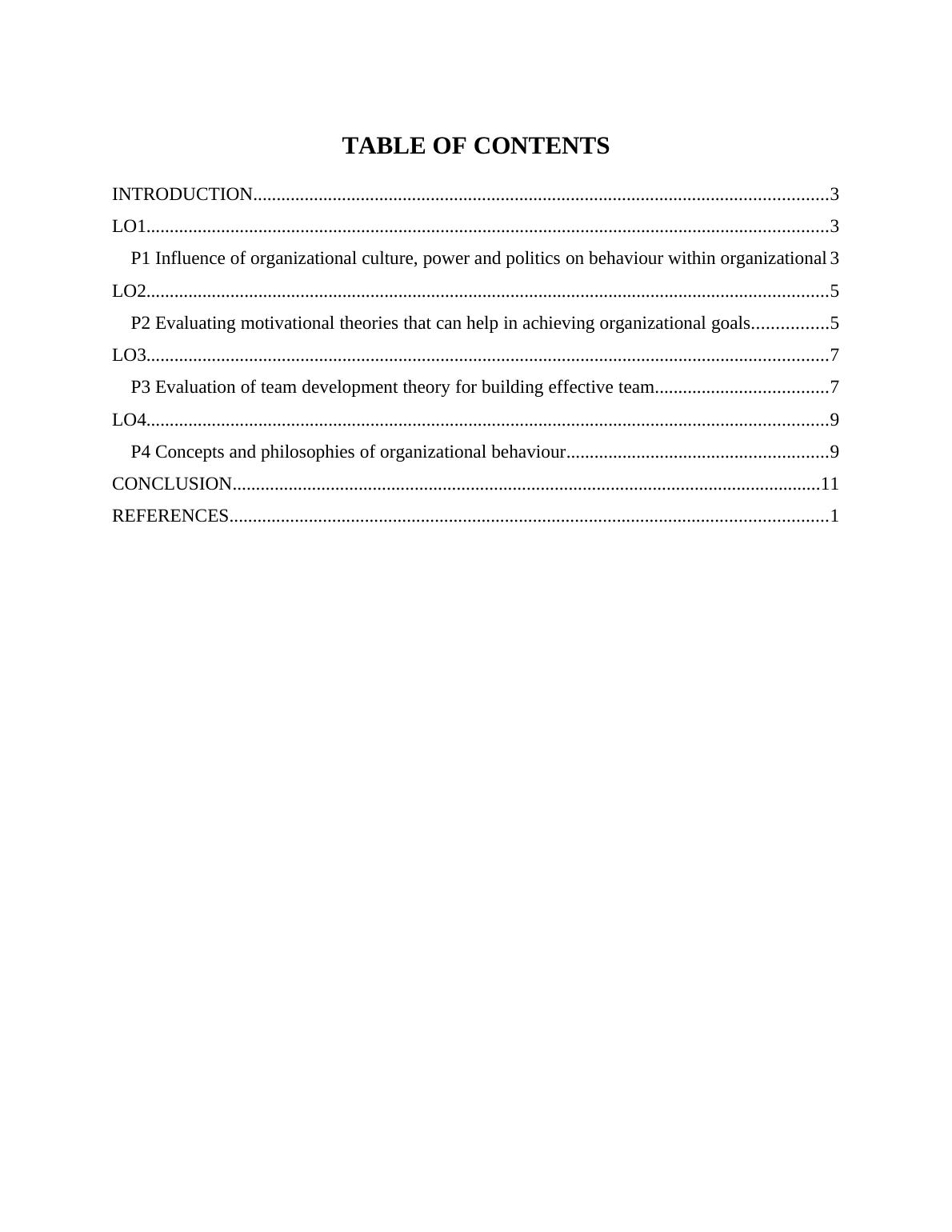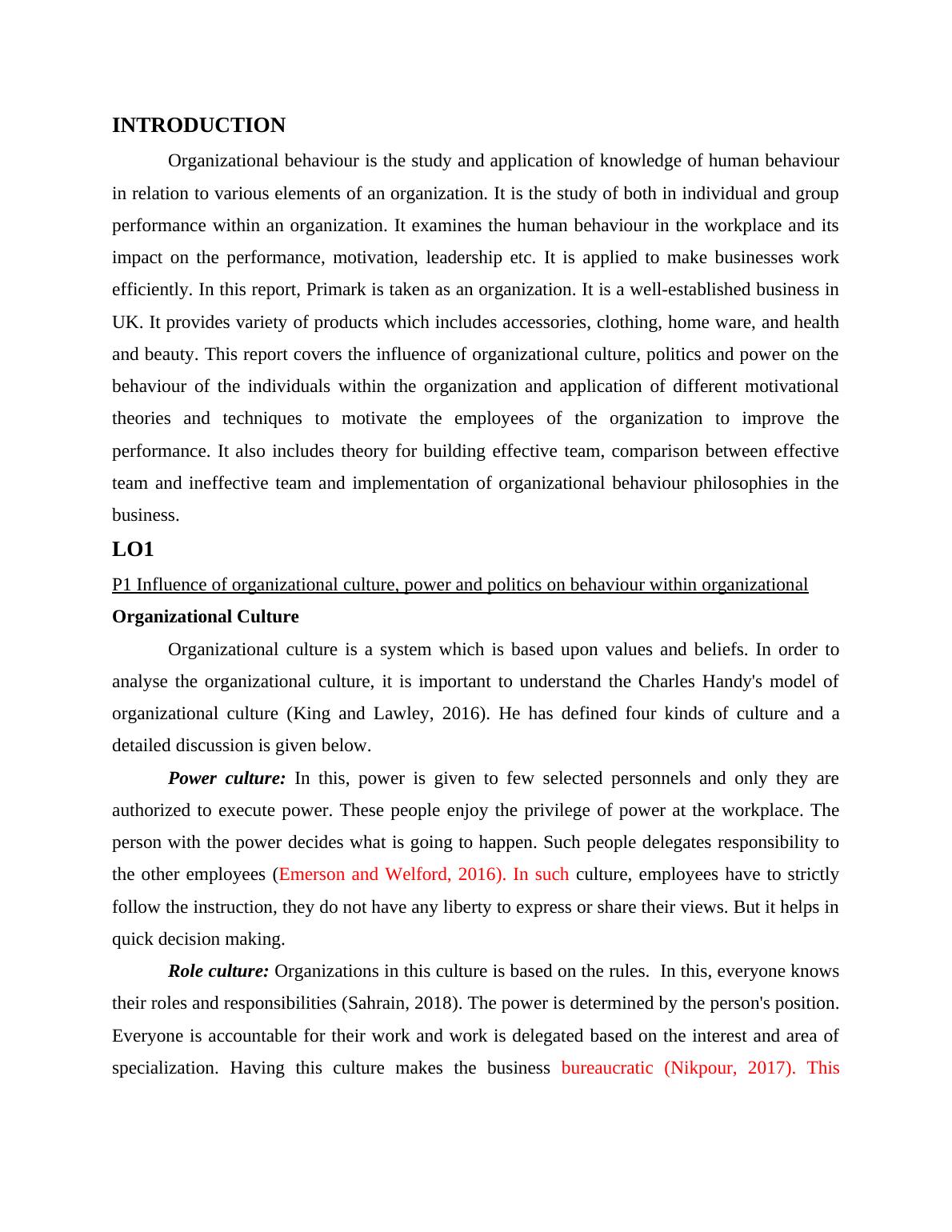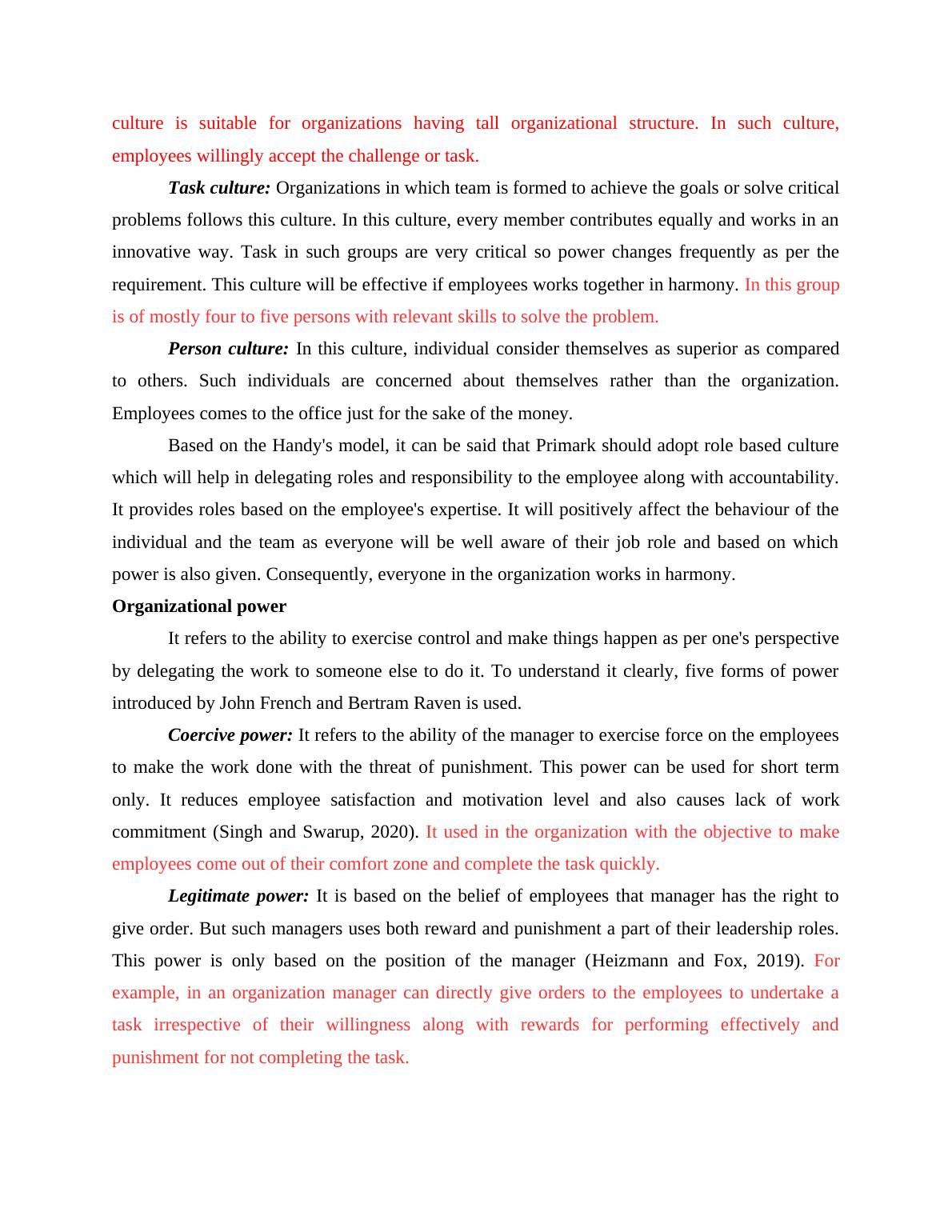Influence of Organizational Culture, Power, and Politics on Behavior
Added on 2023-01-13
15 Pages5255 Words72 Views
Organisational behaviour

TABLE OF CONTENTS
INTRODUCTION...........................................................................................................................3
LO1..................................................................................................................................................3
P1 Influence of organizational culture, power and politics on behaviour within organizational 3
LO2..................................................................................................................................................5
P2 Evaluating motivational theories that can help in achieving organizational goals................5
LO3..................................................................................................................................................7
P3 Evaluation of team development theory for building effective team.....................................7
LO4..................................................................................................................................................9
P4 Concepts and philosophies of organizational behaviour........................................................9
CONCLUSION..............................................................................................................................11
REFERENCES................................................................................................................................1
INTRODUCTION...........................................................................................................................3
LO1..................................................................................................................................................3
P1 Influence of organizational culture, power and politics on behaviour within organizational 3
LO2..................................................................................................................................................5
P2 Evaluating motivational theories that can help in achieving organizational goals................5
LO3..................................................................................................................................................7
P3 Evaluation of team development theory for building effective team.....................................7
LO4..................................................................................................................................................9
P4 Concepts and philosophies of organizational behaviour........................................................9
CONCLUSION..............................................................................................................................11
REFERENCES................................................................................................................................1

INTRODUCTION
Organizational behaviour is the study and application of knowledge of human behaviour
in relation to various elements of an organization. It is the study of both in individual and group
performance within an organization. It examines the human behaviour in the workplace and its
impact on the performance, motivation, leadership etc. It is applied to make businesses work
efficiently. In this report, Primark is taken as an organization. It is a well-established business in
UK. It provides variety of products which includes accessories, clothing, home ware, and health
and beauty. This report covers the influence of organizational culture, politics and power on the
behaviour of the individuals within the organization and application of different motivational
theories and techniques to motivate the employees of the organization to improve the
performance. It also includes theory for building effective team, comparison between effective
team and ineffective team and implementation of organizational behaviour philosophies in the
business.
LO1
P1 Influence of organizational culture, power and politics on behaviour within organizational
Organizational Culture
Organizational culture is a system which is based upon values and beliefs. In order to
analyse the organizational culture, it is important to understand the Charles Handy's model of
organizational culture (King and Lawley, 2016). He has defined four kinds of culture and a
detailed discussion is given below.
Power culture: In this, power is given to few selected personnels and only they are
authorized to execute power. These people enjoy the privilege of power at the workplace. The
person with the power decides what is going to happen. Such people delegates responsibility to
the other employees (Emerson and Welford, 2016). In such culture, employees have to strictly
follow the instruction, they do not have any liberty to express or share their views. But it helps in
quick decision making.
Role culture: Organizations in this culture is based on the rules. In this, everyone knows
their roles and responsibilities (Sahrain, 2018). The power is determined by the person's position.
Everyone is accountable for their work and work is delegated based on the interest and area of
specialization. Having this culture makes the business bureaucratic (Nikpour, 2017). This
Organizational behaviour is the study and application of knowledge of human behaviour
in relation to various elements of an organization. It is the study of both in individual and group
performance within an organization. It examines the human behaviour in the workplace and its
impact on the performance, motivation, leadership etc. It is applied to make businesses work
efficiently. In this report, Primark is taken as an organization. It is a well-established business in
UK. It provides variety of products which includes accessories, clothing, home ware, and health
and beauty. This report covers the influence of organizational culture, politics and power on the
behaviour of the individuals within the organization and application of different motivational
theories and techniques to motivate the employees of the organization to improve the
performance. It also includes theory for building effective team, comparison between effective
team and ineffective team and implementation of organizational behaviour philosophies in the
business.
LO1
P1 Influence of organizational culture, power and politics on behaviour within organizational
Organizational Culture
Organizational culture is a system which is based upon values and beliefs. In order to
analyse the organizational culture, it is important to understand the Charles Handy's model of
organizational culture (King and Lawley, 2016). He has defined four kinds of culture and a
detailed discussion is given below.
Power culture: In this, power is given to few selected personnels and only they are
authorized to execute power. These people enjoy the privilege of power at the workplace. The
person with the power decides what is going to happen. Such people delegates responsibility to
the other employees (Emerson and Welford, 2016). In such culture, employees have to strictly
follow the instruction, they do not have any liberty to express or share their views. But it helps in
quick decision making.
Role culture: Organizations in this culture is based on the rules. In this, everyone knows
their roles and responsibilities (Sahrain, 2018). The power is determined by the person's position.
Everyone is accountable for their work and work is delegated based on the interest and area of
specialization. Having this culture makes the business bureaucratic (Nikpour, 2017). This

culture is suitable for organizations having tall organizational structure. In such culture,
employees willingly accept the challenge or task.
Task culture: Organizations in which team is formed to achieve the goals or solve critical
problems follows this culture. In this culture, every member contributes equally and works in an
innovative way. Task in such groups are very critical so power changes frequently as per the
requirement. This culture will be effective if employees works together in harmony. In this group
is of mostly four to five persons with relevant skills to solve the problem.
Person culture: In this culture, individual consider themselves as superior as compared
to others. Such individuals are concerned about themselves rather than the organization.
Employees comes to the office just for the sake of the money.
Based on the Handy's model, it can be said that Primark should adopt role based culture
which will help in delegating roles and responsibility to the employee along with accountability.
It provides roles based on the employee's expertise. It will positively affect the behaviour of the
individual and the team as everyone will be well aware of their job role and based on which
power is also given. Consequently, everyone in the organization works in harmony.
Organizational power
It refers to the ability to exercise control and make things happen as per one's perspective
by delegating the work to someone else to do it. To understand it clearly, five forms of power
introduced by John French and Bertram Raven is used.
Coercive power: It refers to the ability of the manager to exercise force on the employees
to make the work done with the threat of punishment. This power can be used for short term
only. It reduces employee satisfaction and motivation level and also causes lack of work
commitment (Singh and Swarup, 2020). It used in the organization with the objective to make
employees come out of their comfort zone and complete the task quickly.
Legitimate power: It is based on the belief of employees that manager has the right to
give order. But such managers uses both reward and punishment a part of their leadership roles.
This power is only based on the position of the manager (Heizmann and Fox, 2019). For
example, in an organization manager can directly give orders to the employees to undertake a
task irrespective of their willingness along with rewards for performing effectively and
punishment for not completing the task.
employees willingly accept the challenge or task.
Task culture: Organizations in which team is formed to achieve the goals or solve critical
problems follows this culture. In this culture, every member contributes equally and works in an
innovative way. Task in such groups are very critical so power changes frequently as per the
requirement. This culture will be effective if employees works together in harmony. In this group
is of mostly four to five persons with relevant skills to solve the problem.
Person culture: In this culture, individual consider themselves as superior as compared
to others. Such individuals are concerned about themselves rather than the organization.
Employees comes to the office just for the sake of the money.
Based on the Handy's model, it can be said that Primark should adopt role based culture
which will help in delegating roles and responsibility to the employee along with accountability.
It provides roles based on the employee's expertise. It will positively affect the behaviour of the
individual and the team as everyone will be well aware of their job role and based on which
power is also given. Consequently, everyone in the organization works in harmony.
Organizational power
It refers to the ability to exercise control and make things happen as per one's perspective
by delegating the work to someone else to do it. To understand it clearly, five forms of power
introduced by John French and Bertram Raven is used.
Coercive power: It refers to the ability of the manager to exercise force on the employees
to make the work done with the threat of punishment. This power can be used for short term
only. It reduces employee satisfaction and motivation level and also causes lack of work
commitment (Singh and Swarup, 2020). It used in the organization with the objective to make
employees come out of their comfort zone and complete the task quickly.
Legitimate power: It is based on the belief of employees that manager has the right to
give order. But such managers uses both reward and punishment a part of their leadership roles.
This power is only based on the position of the manager (Heizmann and Fox, 2019). For
example, in an organization manager can directly give orders to the employees to undertake a
task irrespective of their willingness along with rewards for performing effectively and
punishment for not completing the task.

End of preview
Want to access all the pages? Upload your documents or become a member.
Related Documents
Influence of Power, Culture and Politics on Individual and Team Performancelg...
|19
|4760
|33
Organizational Behaviour Assignment (pdf)lg...
|22
|6333
|365
Impact of Politics, Organizational Culture and Power on Team and Individual Performancelg...
|16
|4533
|25
Organizational Behaviour: Influence of Culture, Politics, and Powerlg...
|15
|5024
|81
12 – Organisational Behaviourlg...
|14
|3923
|59
Influences of Culture, Politics and Power on Organizational Behaviourlg...
|18
|5797
|62
